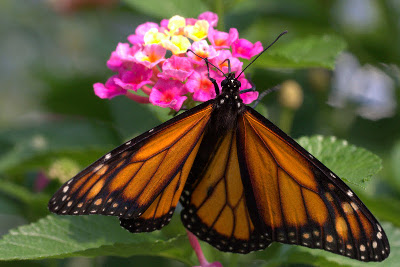| Share |  |
 | |||
Having Hope When You've Been Stepped On
My daughter was about two-and-a-half when she stepped on a butterfly.
We do this every spring as we prepare for Easter, order a cup of caterpillars and follow their journey to new life. We watch the change, marvel again at the miracle: how the tomb doesn’t always mean death; maybe it means resurrection.
We remember that we are the ones who die to self and then gain new life in Christ, like caterpillars willingly spinning themselves into tight dormancy only to be made new.
We watched those caterpillars climb all over the tiny plastic cup for about a week. Then they scaled the sides of the cup, flipped themselves upside down and wrapped themselves into a chrysalis.
They looked dead for a week.
One morning, I shuffled around the kitchen, moving through routine with my eyes barely cracked open. Poured cereal. Made tea. Oversaw teeth-brushing and hair-brushing.
Then I saw the wings.
The chrysalis had cracked open and there in the morning light sat our first butterfly, fanning his wings slowly, testing the air, while the other caterpillars remained entombed.
Over the next day or so, the other new butterflies pushed their way out and flexed their wings.
We squeezed drops of sugar water on freshly cut chrysanthemums and watched the butterflies strengthen. First they sat in stillness. Then they hopped to the bottom and explored. Then they started flying around in circles, eager for freedom.
So, we set them free.
We gathered into the garden in the warm sun of a spring Saturday and one by one released each butterfly into our garden.
But we forgot to explain the difference between butterflies and bugs to my youngest daughter, I suppose.
When one of the butterflies flew up and then back to the ground, she squashed it. Quick as any reflex, she just stomped down her tiny foot on the ‘pest’ just like we would any spider.
We all tried to stop her. It was like a slow motion moment in a film, with us leaping to try to rescue the butterfly and prevent the impending doom, but failing in the end.
Amazingly enough, that butterfly still lived. We eased him and his bruised wing onto a flower where he could enjoy some food without needing to fly.
Maybe you’ve been that butterfly.
Eager to fly. Excited for freedom. Hoping for beauty.
Then crushed, bruised, broken.
Maybe you’ve started this year with anticipation, holding your breath for that first sign of good news.
And you’ve already felt like a giant foot has squashed you to the ground.
Maybe it seems like nothing ever changes even though you desperately long for it to change.
Proverbs 13:12 says:
Hope deferred makes the heart sick, but a longing fulfilled is a tree of life.
Hope isn’t a fickle whim, a fanciful impression that maybe good things will come your way.
Hope is a steadfast knowledge, an anchor of truth that without a doubt you know: God is good and He will take care of you.
And when you feel a little bruised and battered, like a butterfly crushed at that first taste of freedom, hope can feel a little shaky, a little elusive, a little hard to see in the deep of the dark.
Surely Noah must have had those days, floating on that ark long, long after the rain had ceased and the world was covered in a blanket of endless water.
How long, Lord? When will this end, Lord? Will we ever get off this ark, Lord?
Are we stuck here forever? Will we walk on dry land again? Can we please live without the stench of a floating zoo in our nostrils day and night?
He started sending out messengers of hope: ravens and doves.
He was desperate for the sign, the assurance of dry, solid ground.
The dove brought him an olive leaf. More than that, the dove brought him renewed hope.
Max Lucado writes:
“An olive leaf. Noah would have been happy to have a bird but to have the leaf! This leaf was more than foliage; this was promise. The bird brought more than a piece of a tree; it brought hope. For isn’t that what hope is? Hope is an olive leaf—evidence of dry land after flood… (From A Love Worth Giving)
And so, when we are weary and defeated, we can seek hope. We can send out those doves and ravens and ask God for a sign of dry land after flood.
And so, when we are strong, we can be the dove for another. We can bring olive leaves to the hurting. We can bring reminders of hope and God’s faithfulness to those who can’t see the solid ground.
Do you need an olive leaf today? Do you need to bring an olive leaf to someone else who is hurting?
To read more devotionals by Heather King, you can visit her blog here: http://heathercking.org/
*Photography by David Sullivan (ciophoto.com)
Copyright © 2008-2015 Heather King
Post Your Comment...
|
|
||||||||||||


